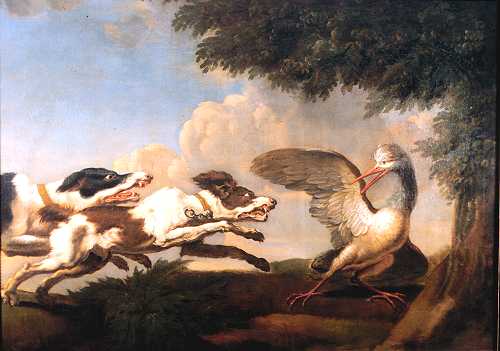Country and courtly sports: hunting
The noble art of venery or hunting: popular from before the time of Chaucer's monk, it was the sport of kings, queens, and the landed gentry in Shakespeare's time. It was raised almost to the height of a mystery with its own specialized vocabulary. The green woods in the comedies echo with horns and the musical baying* of hounds. Duke Theseus in A Midsummer Night's Dream and his captured bride Hippolyta compete poetic descriptions* of the "musical confusion" of the baying of the hounds. Hunting was, of course, a pastime of the nobility; Queen Elizabeth herself enjoyed the sport.
Sympathy for the pursued?
In the narrative poem Venus and Adonis, Venus describes the chase from the point of view of the hare being pursued:
And when thou hast on foot the purblind* hare,
Mark the poor wretch, to overshoot his troubles,
How he outruns the wind, and with what care
He cranks and crosses with a thousand doubles.
The many musits* through the which he goes
Are like a labyrinth to amaze* his foes.
(lines 679-84)
A Lord, in As You Like It, describes a wounded stag that comes to an "antique" oak:
To the which place a poor sequest'red* stag
That from the hunter's aim had ta'en a hurt
Did come to languish; and indeed, my lord,
The wretched animal heaved forth such groans
That their discharge did stretch his leathern coat
Almost to bursting, and the big round tears
Coursed one another down his innocent nose
In piteous chase.
(2.1.33-40)
- amaze
- Puzzle, confuse.
- musits
- Holes, gaps in hedges, or other hiding places.
- purblind
- Near-sighted.
- sequest'red
- Hidden, separated.
The Society for Creative Anachronism has information about early sports and pastimes:
Footnotes
-
Hounds baying
Gervase Markham's prose becomes almost poetic as he writes on the sweetness of a cry of hounds:
If you would have your kennel for sweetness of cry, then you must compound it of some large dogs, that have deep solemn mouths, and are swift in spending, which must as it were bear the bass in the consort, then a double number of roaring, and loud ringing mouths, which must bear the counter-tenor*, then some hollow plain sweet mouths, which must bear the mean or middle part; and so with these three parts of music you shall make your cry perfect. . . .
And you shall understand that this composition is best to be made of the swiftest and largest deep mouthed dog, the slowest middle sized dog, and the shortest legged slender dog, amonst these you cast in a couple or two of small singing beagles, which as small trebles may warble amongst them: the cry will be a great deal the more sweeter.
(Markham, Country Contentments)- Counter-tenor
- A male contralto, singing falsetto.
-
Duke Theseus and Hippolyta on their hounds
Theseus: We will, fair queen, up to the mountain's top,
And mark the musical confusion
Of hounds and echo in conjunction.
Hippolyta: I was with Hercules and Cadmus once,
When in a wood of Crete they bayed* the bear
With hounds of Sparta. Never did I hear
Such gallant chiding; for, besides the groves,
The skies, the fountains, every region near
Seemed all one mutual cry. I never heard
So musical a discord, such sweet thunder.
(A Midsummer Night's Dream, 4.1.110-19)- bayed
- The animal was at bay when it turned to face the pursuing hounds.
